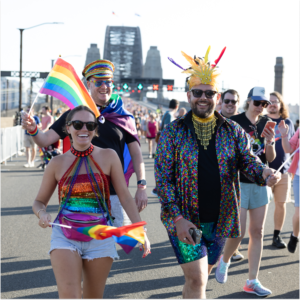17 year-old Christian Yeung outlines the history of Pride Month

March 5, 2023. New York Pride March.
June 13, 2024
‘Say it loud, gay is proud’: A brief history of Pride Month
It’s June, which means that it’s Pride Month! Although it is still an ongoing battle to ensure equal rights and opportunities for the LGBTQIA+ community, we have come a long way since the early days of the Pride movement.
So let us take some time to discuss the origins of this incredible celebration of queerness.
The 1960s were a hostile time for many marginalized groups, including African Americans and LGBTQIA+ people. The history of the Civil Rights Movement is well known now, due to its success in protests like the ‘sit-ins’, where African American students sat at ‘White Only’ counters, and bus boycotts, where the Black community rallied to change the Montgomery bus system.
On the other hand, LGBTQIA+ movements aren’t discussed as much, but one in particular that sparked the Pride movement was the 'sip-ins'.
During this time, many LGBTQIA+ people were closeted, due to the social prejudice they would face if they revealed they were gay.
As sexual orientation is much more difficult to determine when compared to race or gender, New York state regulations said that bars could not serve men who were intimate and participated in ‘disorderly conduct’: buying another man a drink or perhaps talking too flirtatiously.
In other words, if you were perceived as gay, you could not drink in bars.
However, in 1966, three men, Dick Leitsch, Craig Rodwell, and John Timmons from an early national gay rights organization, Mattachine Society, sat in Julius’ Bar in New York. They ordered drinks, but when they announced that they were gay, the bartender refused to serve them, stating it was illegal.
The group got the court case it needed and in 1967, the Supreme Court ruled that homosexuals could legally be served, and laws became more lenient on kissing, touching, or ‘cruising’ not to be categorized as ‘disorderly conduct’.
Meanwhile, Mafia families realized that bars serving a gay clientele could be profitable. One such mob-owned place in New York was the Stonewall Inn in Greenwich Village, which soon became a very popular gay bar and nightclub.
On June 28, 1969, the NYPD raided the inn and arrested 13 people, partially due to bootleg alcohol but also on account of violating gendered clothing laws. Angered by the constant harassment and prejudice bar patrons and neighbors felt, the Stonewall uprising began.
Over five days, people gathered and although it is often categorized as a ‘riot’, it was more of a rebellion, where objects were thrown, but there were also kicklines, dancing, singing, and chanting – most notably the phrase “Say it loud, gay and proud”.
More important, however, was the rebellion’s effect on the Gay Rights Movement. It led to the creation of LGBTQIA+ activist groups such as the Gay Liberation Front. The following year, 1970, also saw the first Pride marches on June 28, the anniversary of the Stonewall rebellion.
There were marches in New York City, Los Angeles, and Chicago to commemorate the Stonewall rebellion and advocate for gay rights. From here, the movement only grew larger, until President Bill Clinton officially proclaimed June as Pride Month in 1999.
According to Outright International, Pride Month was held in 101 countries across the world.
There is still work to be done, but let us take this time to celebrate!





